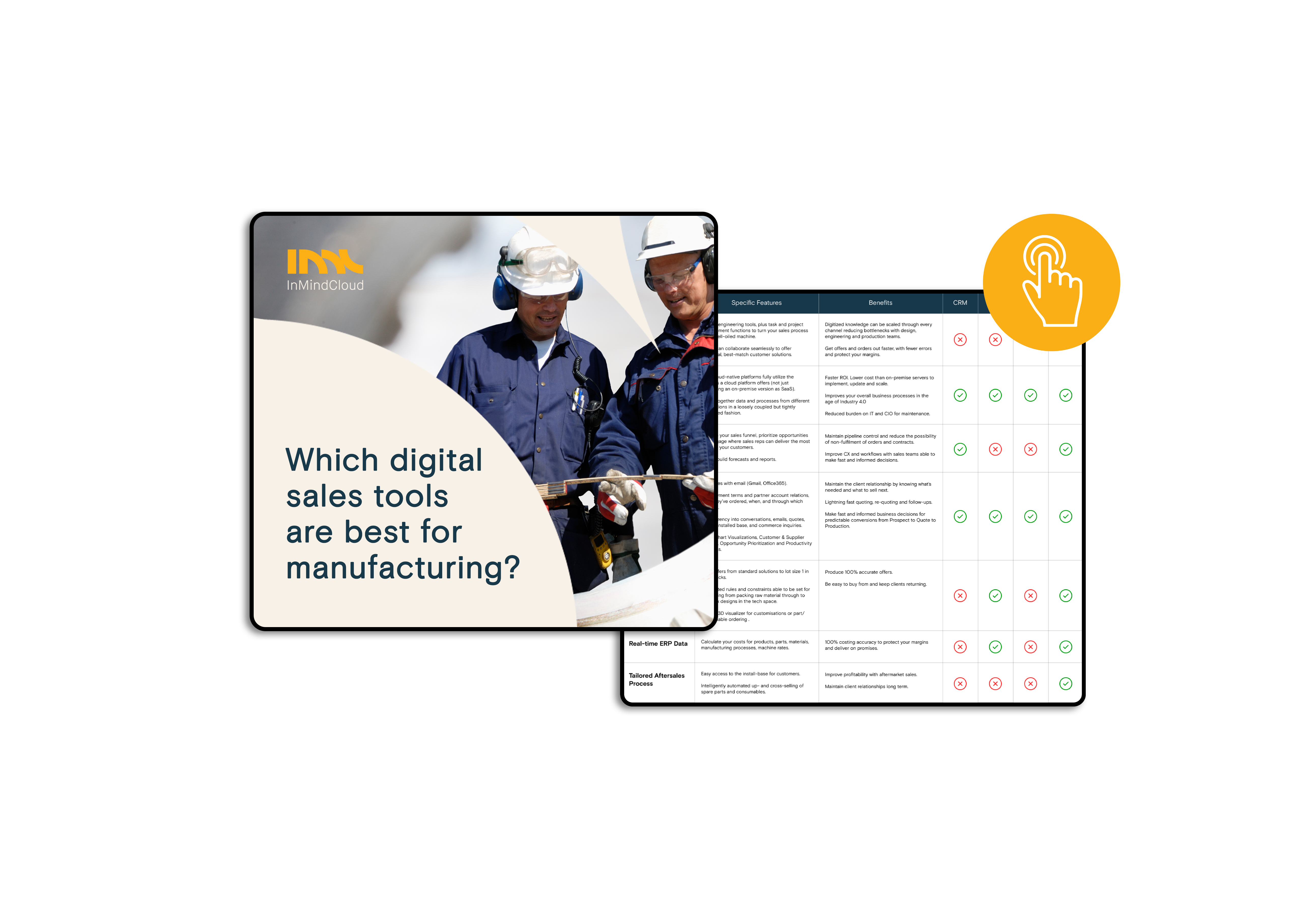A manufacturer’s challenges are always evolving. In recent years, COVID-19 has exposed an urgent need to adapt to unpredictable market conditions. As a result, industry leaders are accelerating their digital transformation efforts to stay competitive—and profitable. Their solution of choice? Manufacturing-focused, cloud-based systems that offer remote access and process automation. This approach can help manufacturers improve productivity, lower operational costs, and access untapped opportunities.
Due to the nature of manufacturing sales—a finite customer base, long sales cycle, and complex sales process—manufacturers are focusing on keeping existing customers while finding new ones. To address their sales challenges, manufacturers are increasingly turning to customer relationship management (CRM) solutions.
Accelerate your solution search with this CRM Software Requirements Checklist. Use it to see what CRM features your business needs, and what to focus on in your vendor search.
Typical features of a modern CRM for manufacturing
Manufacturing companies often use CRMs to manage account and contact data. However, modern CRMs provide much more functionality. They can now be used to track opportunities and sales progress, store comprehensive lead information, and perform complex sales data analytics. And the most critical function of all is the ability to integrate with and use real-time information from a manufacturer’s ERP.
However, these are just some of the typical features of a CRM. Your manufacturing business may require features that serve your unique needs as a manufacturer. After you have identified your business goals and your main users, you can match the corresponding capabilities your ideal solution should have. In our requirements checklist, we have put together a comprehensive list of categories that your CRM should cover. Each category also includes granular features that you can drill down on.
Here is a list of primary features that your manufacturing-focused CRM should have:
| 1. Account & Contact Management | 2. ERP Account Integration | 3. Lead management |
| 4. Opportunity management | 5. Sales Cycle Management | 6. Opportunity Data Management |
| 7. Funnel management | 8. Territory & Quota Management | 9. Activity Management |
| 10. Approval Management | 11. Sales Cockpit & Reporting | 12. Team selling |
| 13. Email Client Integration (Outlook, Gmail, etc.) | 14. Calendar Client Integration (Outlook, Gmail, etc.) | 15. Quotation/CPQ Integration |
| 16. Commerce Integration | 17. Open APIs for Integration | 18. Data import and export tools |
| 19. Partner Relationship Management (PRM) | 20. Internationalization |
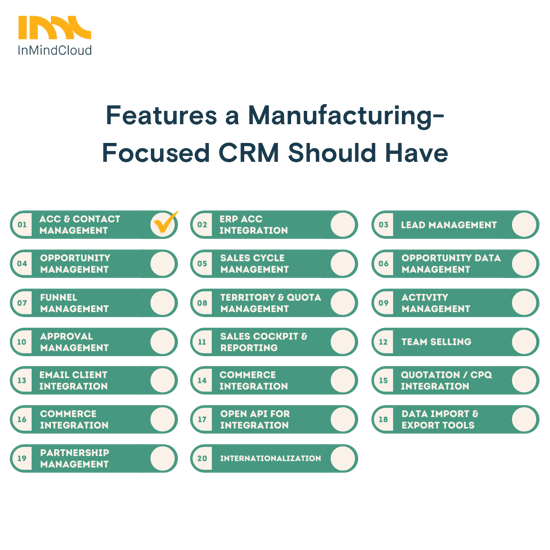
A CRM built for manufacturing does more than just account and contact management
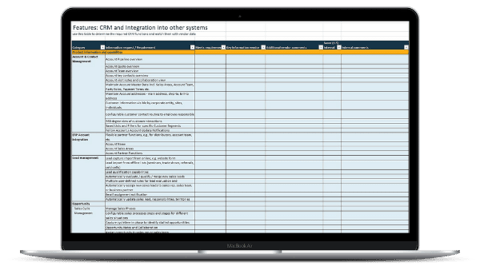
Our CRM software compliance table deep dives into the granular features that your users may need
Identify the goals your CRM needs to achieve
Setting clear business goals for your manufacturing company is a critical first step in finding a CRM. Once you know what you want to achieve, you can identify the critical features your CRM needs to have or the level of customization needed in the software.
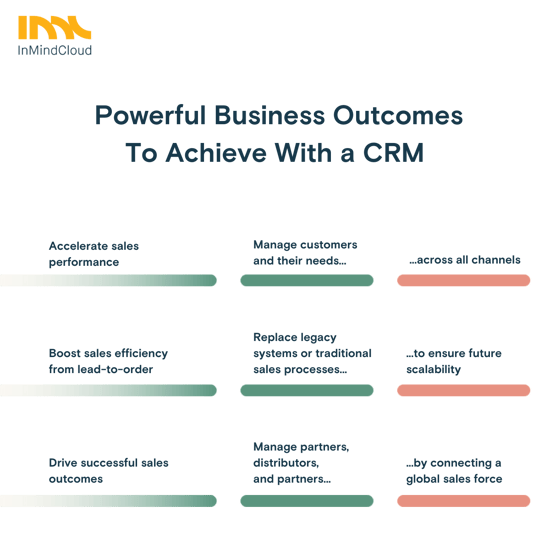 Find a best-fit CRM for your manufacturing business by identifying your business goals
Find a best-fit CRM for your manufacturing business by identifying your business goals
Here are some powerful outcomes you can achieve with this digitalization initiative:
Enable success across all channels
- Accelerate sales performance
- Manage customers and their needs
Ensure future scalability
- Boost sales efficiency from lead-to-order
- Replace legacy systems or traditional sales
Connect a global salesforce
- Drive successful sales outcomes
- Manage partners, distributors, and partners
Who are the CRM users in your manufacturing business?
Before buying CRM software, you would also need to be aware of who needs it and why. In our requirements checklist, we included a list of departments and roles that could potentially benefit from a CRM built for manufacturing. Knowing the departments and number of users can also help when planning a feasible budget for your digital sales solution. Getting software that caters to their needs and solves their problems also increases the likelihood of increased user adoption.
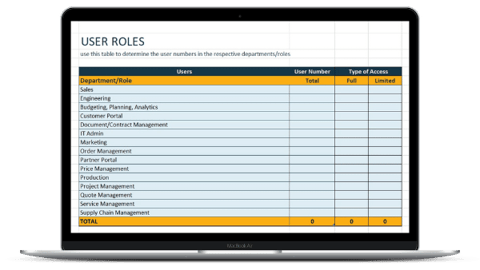
List of roles and departments that could benefit from an advanced CRM built for manufacturing
Bring out the full potential of your new CRM
Your CRM cannot exist as an island or plug-gap solution. To bring out its full potential, you should examine the role it plays in your sales cycle, the problems it can help solve, and how it affects other processes.
Throughout the entire customer engagement journey, a CRM should cover every touchpoint your customers have with your business.
Customer relationship management software—as the name implies—aims to manage the relationship with your customers. This relationship is shaped by many touchpoints along the customer journey. To provide an exceptional buying experience, your digital initiative should aim to connect all these touchpoints.
If you want a 360-degree overview of what your customer bought yesterday, you will also want to know what he buys tomorrow. And this is only possible when your customer data is universally connected with what your business has to offer along the customer journey.
Imagine your CRM to be the starting point for you to access important quote data and analyze what product configurations sell well in which regions. Or to monitor how often your customer orders spare parts in your online aftersales portal to suggest a machine upgrade or upsell to the latest service contract.
This way, you can tie it all together to deliver that level of customer experience that binds your customers to your business effectively. By connecting data from CPQ and Commerce, manufacturers can gain deep insights into production data and match it with sales performance and customer buying behavior.
Knowing and managing your customers’ journey end-to-end is an effective way to build repeatable business success and leverage growth opportunities.
Define your manufacturing CRM requirements
By downloading our checklist, you’ve already taken a first step towards getting a CRM that fits your manufacturing business. Now you need to start defining your needs and requirements. To make that step easier for you, use our Excel template as a basis and remove or add your unique requirements.
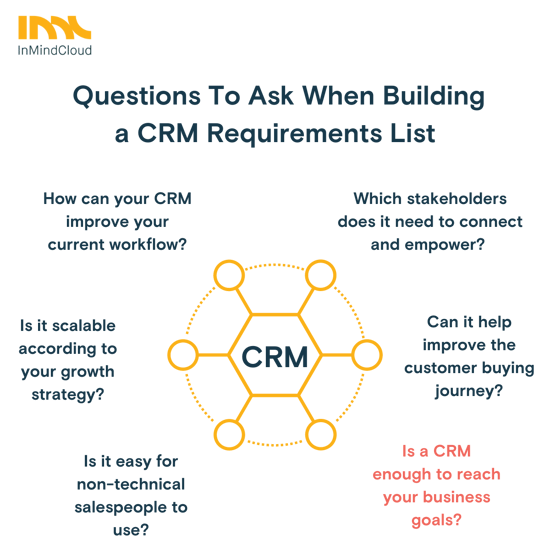
Some useful questions to ask yourself and your team when building a CRM requirements list
Some questions you should ask when editing the requirements lists can be:
- How can a CRM improve your current workflow?
- Which stakeholders do your future CRM need to connect and empower?
- Is the CRM scalable according to your growth strategy?
- Would it be easy for non-technical salespeople to use?
- Can it help improve the customer buying journey?
- Is a CRM system enough to reach your goals? (hint: it’s only part of the solution)
Send a CRM feature compliance table to potential vendors
After asking key questions and identifying the users, it’s time to define a selection team. This team would include decision-makers and users alike. The teams—like sales, customer success/service, or marketing—that use the CRM most should have the most input on ranking features of your CRM software.
Now it’s time to turn your requirements list into a compliance table or document and send it to potential vendors. Based on their replies you can create a shortlist and the selection team would then narrow down on their choices and start negotiations. Keep an eye out for transparent pricing and business conditions to avoid being locked into a solution that may not deliver the promised results. Once the preferred vendor has been selected, the team would proceed to get buy-in from all stakeholders.
Conclusion: A careful CRM software vendor selection pays off
Once you have selected your vendor—one that should ideally be a trusted digitalization partner—the next step of your digitalization journey can start. From here on, an implementation team should be assigned. This team would then start collaborating with the vendor to implement your digital sales solution. Your digitalization partner will help you maintain clarity on the expected ROI, fully map out your implementation approach, and guide you on the evaluation process.
The right partner with manufacturing expertise and experience will understand what digital sales success for your business looks like. They will be able to draw on their knowledge to guide you along the path to digital maturity.
To get a head start in your Commerce selection process, you can always give our interactive software finder a try. All you need to do is answer a few questions, and we'll send you a personalized Digital Sales Software Comparison Checklist to help you find the right software for your business. The comprehensive feature list is based on manufacturing industry standards and covers the needs of most manufacturing companies.
We know that a CRM is only one piece of the puzzle in your sales digitalization. That is why the checklist also includes features and capabilities for CPQ and Commerce—key components in an effective digital sales solution for manufacturers.
Discover the must-have CPQ features for manufacturers here.
Discover the must-have Commerce features for manufacturing here.
With this checklist, you can strategize on how to digitalize and align your customer journey and sales process. And meet your customers where they are, every step of the way. If you would like to have a deeper conversation about your challenges and digital sales requirements, you can always book a no-obligation consultation with our experts. We will be more than happy to walk you through how a modern sales solution built for manufacturing can help your business.

 Deutsch
Deutsch


